 What Is a License Plate Reader and Can Police Track You Using It?
What Is a License Plate Reader and Can Police Track You Using It?
Table of Contents
- Georgia License Plate
- Georgia License Plate Design and Formats
- Georgia Vanity License Plate
- Most Popular Georgia Special Plate Numbers
- Georgia License Plate Lookup
- What Do I Need to Get a License Plate in Georgia?
- Differences Between a Passenger License Plate and Commercial License Plate in Georgia
- How To Renew License Plate in Georgia
- How To Transfer a License Plate in Georgia
- Georgia License Plate Lookup Frequently Asked Questions (FAQ)
 Georgia License Plate
Georgia License Plate
Georgia License plates are tags with alphanumeric characters designed for vehicle identification in the state. A license plate's primary purpose is to help law enforcement agents recognize a vehicle and its owner in the event of an accident, traffic infraction, or other emergencies. As required by Rule 560-10-10 of the Rules and Regulations of the State of Georgia, all types of vehicles must have license plates assigned to them and displayed at all times. These include passenger cars, tractors, trucks, and trailers. Categories of automobiles under passenger vehicles include buses, utility vehicles, station wagons, motor scooters, and motorcycles.
The Motor Vehicle Division of the Georgia Department of Revenue (DOR) issues several license plate options to vehicle owners, including the following:
- Standard License Plates - These are regular license plates issued to vehicle owners
- Specialty License Plates - These license plates represent special causes or interests and are only permitted in private passenger vehicles and trailers. The state offers several specialty license plate designs from which vehicle owners can choose, depending on their special interests. Georgia special categories license plates include the following:
- Former Prisoner of War License Plate - Any Georgian veteran who is a former prisoner of war discharged under honorable conditions from the United States armed forces qualifies for this specialty license plate. A surviving spouse of such a qualified deceased veteran who remains unmarried is also eligible
- Gold Star License Plate - Only Georgians who are relatives of service members killed in action while serving the United States armed forces qualify for this license plate. Eligible family members include the parents, spouses, siblings, children, siblings' spouses, and step-parents of the deceased service members
- Chosin Reservoir Campaign of 1950 License Plate - Georgia veterans of the nation's armed forces who partook in North Korea's Chosin Reservoir Campaign of 1950 and surviving spouses of qualified deceased veterans can get this specialty license plate
- Pearl Harbor Survivor License Plate - Georgia veterans of the United States armed forces who are survivors of the Japanese attack on Pearl Harbor qualify for this license plate. Similarly, surviving spouses of qualified deceased veterans under this category are eligible, provided they are not remarried
- National Guard License Plate - Serving members of the state's National Guard qualify for this license plate type. Likewise, surviving spouses of members of the Georgia National Guard who died while serving the United States in a battle arena qualify for this specialty license plate, provided they do not remarry
- Prestige (vanity) License Plates - Also issued to only private passengers and trailers, prestige license plates contain a combination of numbers and letters selected by vehicle owners. The DOR issues them on the standard peach plate background only
Other types of specialty license plates are also available to Georgia veterans. License plates must be attached to visible parts of vehicles and in a manner that they will not swing. Under state law, Georgia license plates must be displayed on the rear of all passenger cars, trailers, and trucks. If a license plate attached to the rear of a truck or trailer would be defaced, lost, or destroyed due to its routine activities, the license plate may be displayed on the front of the vehicle. Generally, tractors registered in Georgia must always display their license plates on the front. Information embossed on a typical Georgia vehicle license plate includes the county name, state name written in block letters (GEORGIA), and alphanumeric serial number, which is the license plate number.
 Georgia License Plate Design and Formats
Georgia License Plate Design and Formats
Georgia license plates have been issued in several colors, but as of 2024, they come in graphics of peaches, showing the state's famous peaches. Typically, vehicle license plates in the state are made of metallic plates, but Georgia recently introduced Digital License Plates (DLPs). The state's standard vehicle license plates include identifying numbers composed of a seven-character alphanumeric number. On the other hand, a motorcycle license plate has six alphanumeric characters.
The characters on a Georgia license plate can be arranged in different forms, depending on the license plate type. These characters cannot contain V, U, Q, O, and I alphabets. A typical Georgia license plate also includes the state's name written in block letters (GEORGIA) on the top and the county name at the bottom of the aluminum plate. The words inscribed on specialty license plates may not contain defamation remarks or misleading self-definitions. Although Georgia has hundreds of license plate designs, below are photos of commonly used ones:
Standard Vehicle License Plate:
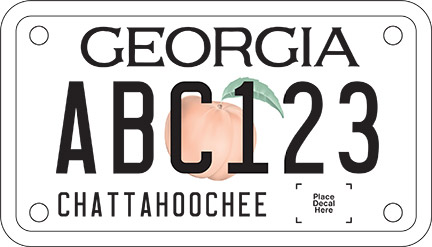
Specialty License Plates:
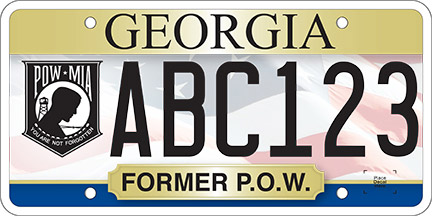
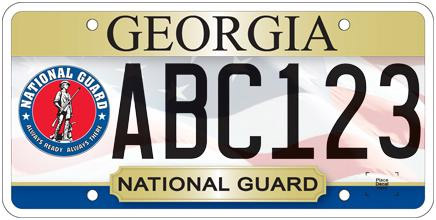
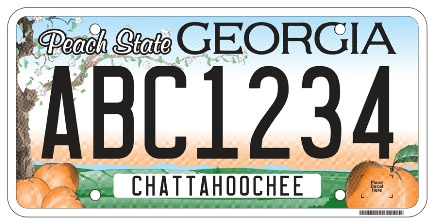
Standard Motorcycle License Plate:
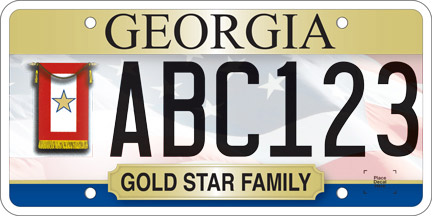
 Georgia Vanity License Plate
Georgia Vanity License Plate
Also known as prestige license plates in the state, Georgia vanity license plates are composed of a combination of numbers and letters selected by vehicle owners. They are only allowed on private passenger vehicles and trailers and are issued on the standard peach plate background only. You must visit your local County Tag Office to order a Georgia vanity license plate. Before visiting, it is important to check the availability of your prestige (vanity) license plate to determine if it is available for issuance. To do this, select the plate of interest (passenger vehicle or motorcycle), considering that passenger vehicle license plates are limited to seven characters and motorcycle plates are limited to six. Note that the state's Department of Revenue Regulation 560-10-22-.02 prohibits the manufacturing or display of certain combinations on Georgia vanity license plates.
You can complete the Special (Personal) Prestige License Application Form (Form MV-9B) to apply for a Georgia vanity license plate if the selected license plate is available. After filling out the form, submit it to your local County Tag Office with a $35 manufacturing fee (one-off), a $20 tag fee, and a $35 annual tag fee. If you want the license plate mailed once approved, you must pay an additional $1 mailing fee. You may appeal the denial of your application for a Georgia vanity license plate within 30 days of being notified of the rejection.
 Most Popular Georgia Special Plate Numbers
Most Popular Georgia Special Plate Numbers
Commonly used special license plates in Georgia include the following:
- Disabled Person Plate
- Alternative Fuel Plate
- Army Ranger Plate
- Chosin Reservoir Campaign of 1950 in North Korea Plate
- Gold Star Plate
- National Guard Plate
- Former Prisoner of War Plate
- Pearl Harbor Survivor Plate
- Veteran Air Force Plate
- Veteran Marine Plate
- Disabled Veteran Plate
- Veteran Navy Plate
- Woman Veteran Army Plate
- Certified Firefighters Plate
 Georgia License Plate Lookup
Georgia License Plate Lookup
License plate lookup is a service that allows a person to search information specific to a vehicle using its license plate number. Individuals and law enforcement agencies lookup license plates in Georgia for various reasons. One of the most common reasons law enforcement lookup license plates in the state is to determine whether the vehicle being checked has been reported stolen. Law enforcement looks up license plates of vehicles involved in certain crimes or hit-and-run to gather identifying information on the vehicle owner to help with criminal investigations. Furthermore, in Georgia, license plate lookup comes in handy for the police in checking whether a vehicle has unpaid fines or outstanding warrants.
Information that can be obtained from a Georgia license plate lookup includes vehicle information and registration details, make, model, trim, and engine capacity. The Georgia Department of Driver Services (DDS) provides a portal allowing law enforcement and businesses to create accounts and search license plate records. While state law prohibits finding the owner of a vehicle through online systems, you can contact a law enforcement agency in Georgia to have them retrieve information about someone with a license plate number. Alternatively, with Recordsfinder or any other third-party website, you can look up basic information on a vehicle in Georgia using the vehicle's license plate number. However, you may be required to pay certain fees to obtain detailed information on such a vehicle.
Georgia Reverse License Plate Number Search
Reverse license plate number search involves retrieving information about a vehicle using its full plate number. In Georgia, Recordsfinder provides a reliable means of performing a reverse license plate number search in just a few steps. However, it is important to have a Driver's Privacy Protection Act (DPPA)-compliant reason for conducting the search. Otherwise, your search will be declined.
 What Do I Need to Get a License Plate in Georgia?
What Do I Need to Get a License Plate in Georgia?
Certain documents must be provided to obtain a Georgia license plate. They include the following:
- Proof of vehicle ownership:
- Vehicle's original valid title containing seller/buyer information. The title must be assigned to the buyer using their legal name (in full) as printed on their driver's license. Any vehicle 1985 or older does not require a title, but the owner must provide a Bill of Sale
- An accurately completed Form T-22B Certification of Inspection if the vehicle is transferred from a non-title country or state
- A registration certification or Manufacturer's Certificate of Origin (MSO) from a non-title country/state assigned in the vehicle owner's full legal name where the car's title is unavailable
- Valid Georgia's ID card or driver's license
- Proof of insurance issued by Insurance Binder indicating liability coverage or proof filled by the vehicle owner's insurance company directly in the database of the state's Department of Revenue
- A completed Form MV-1 Title/Tag Application
You may complete a Georgia license plate application in person by submitting all the required documents at your County Tag Office or by mail. To save time, you can start your license plate application online on (DRIVES e-Services) before visiting the county Tag Office. It costs $20 to register a standard license plate in Georgia. However, you may be required to pay additional fees depending on the license plate type.
 Differences Between a Passenger License Plate and Commercial License Plate in Georgia
Differences Between a Passenger License Plate and Commercial License Plate in Georgia
Generally, passenger license plates are assigned to private vehicles primarily used for transportation purposes and not for business, hire, or commercial purposes. On the other hand, commercial license plates go on vehicles used primarily for business or commercial purposes. Per Code of Georgia, Section 40-6-76.1, passenger vehicles are those meant to carry no more than 15 passengers and are used for human transportation. These include vans, sport utility vehicles, and pickup trucks, although with certain exemptions. In contrast, under Georgia law, a commercial vehicle is any vehicle weighing at least 10,001 lbs.
The table below highlights the major differences between a Georgia passenger license plate and a commercial license plate:
| Criteria | Passenger License Plate | Commercial License Plate |
|---|---|---|
| Vehicle type/capacity | Issued for vehicles with a capacity of at most 15 passengers | Issued for vehicles with gross weight of 10,001 lbs or more |
| Purpose | Private and transportation | Commercial use or hire purposes |
| Registration process | License plates are registered at the County Tag offices | Registration at the County Tag offices for vehicles operating under 26,000 lbs and traveling only in Georgia. If the vehicle travels out of state and operates at 26,001 lbs, it must be registered online using the Georgia Trucking Portal. Such a vehicle must also be registered with the International Fuel Tax Agreement (IFTA) and International Registration Plan (IRP) |
The requirements for obtaining a Georgia passenger license plate are the same as a standard license plate. These include a vehicle owner's ID card, proof of vehicle insurance, proof of vehicle ownership, and a completed Form MV-1. The state's Motor Vehicle Division of the Department of Revenue provides a checklist for commercial vehicle registration, which includes the requirements for obtaining a commercial license plate.
 How To Renew License Plate in Georgia
How To Renew License Plate in Georgia
Vehicle owners in Georgia can renew their license plates by applying to the state's Motor Vehicle Division in three ways. These include doing it at the County Tag office, using a Self-Serve Kiosk, and online using the state's DRIVES e-Services. Typically, a vehicle owner will be sent a vehicle registration renewal notice at the beginning of their registration month. Anyone who wishes to receive their vehicle registration renewal notices via email can sign up to Go Green.
If you live in a participating county, you can use a Self-Service Kiosk to complete your vehicle registration renewal application, particularly if you meet the following requirements:
- You have proof of liability insurance on file (if applicable)
- Your vehicle is registered in the county (participating county)
- You have a Vehicle Emission Inspection on file (if applicable)
- The renewal notice carries your correct address
- You have a valid driver's license issued in Georgia
Self-service kiosks have on-screen instructions to guide users. Follow the prompts and print your documents once the renewal application is successful.
Vehicle owners living in counties participating in online registration renewal can renew their vehicle registrations online using DRIVES e-Services. If you reside in one of those counties, the renewal notice you receive will contain details about online registration. Generally, the following are needed for online vehicle registration renewal in Georgia:
- Letter ID (found on the renewal notice) or driver's license number
- If your county requires emission testing, a passing vehicle emission inspection
- VIN or license plate number
- Payment for all taxes, registration fees, and convenience fees. You can pay with your credit card, debit card, or electronic check
To renew your Georgia license plate by mail or in person, visit your County Tag office and provide the following:
- Valid Georgia driver's license or valid ID card
- Renewal notice
- Payment for all taxes due and other required fees. The staff at the County Tag office will advise you of the acceptable payment methods during your visit, or you can call them if applying by mail
- Proof that your vehicle has passed emission inspection (if applicable)
- If applicable, proof of liability insurance
Vehicle owners in Georgia are encouraged to renew their license plates before expiry. Otherwise, they risk certain penalties if they drive with expired vehicle registrations. The Georgia Trucking Portal is used to renew commercial license plates in the state.
 How To Transfer a License Plate in Georgia
How To Transfer a License Plate in Georgia
You can transfer your Georgia license plate from an old vehicle to a newly acquired vehicle at your County Tag office if you meet the following requirements:
- You have a current Georgia certificate of registration for the license plate being transferred
- You have applied for the title on the newly purchased vehicle
- You have a current Emissions Control Certificate (if applicable)
- Your valid Georgia ID card or driver's license bears your current address. Where your ID carries a different address, you must provide any of the following documents dated within the last year:
- Statement of bank account
- Utility bill
- Voter registration card showing your residential address
- Rental or lease agreement
- You have proof of valid Georgia insurance
It costs $5 to transfer a current (valid) license plate from an old vehicle to a new car in Georgia. However, if the transfer is being done at the time of registration, a person pays a $20 fee. Typically, the first owner listed on the title for both vehicles (old and new) must be the same unless the license plate being transferred is a prestige or specialty license plate. In such a situation, you must relinquish the prestige or specialty license plate by submitting a completed Relinquishment of a Georgia Prestige or Other Special License Plate Form at the time of the transfer. In addition, only license plates of vehicles with the same license tag classification are transferable in the state. For instance, you cannot transfer a license plate from your trailer to your sedan car.
 Georgia License Plate Lookup Frequently Asked Questions (FAQ)
Georgia License Plate Lookup Frequently Asked Questions (FAQ)
Can I Get a Replacement for My Lost License Plate in Georgia?
Yes. However, before seeking to replace a lost license plate in Georgia, make sure to report the incident to law enforcement. All requests for license plate replacement should be made at the County Tag Office. You need to complete all the required forms and submit them alongside the police report. Generally, Georgia's Motor Vehicle Division charges $8 to replace standard license plates and a $43 fee ($35 manufacturing fee and $8 replacement fee) for special prestige license plates.
What Do Police See When They Run Your License Plates in Georgia?
In Georgia, law enforcement agencies, including police, can obtain the following information about a vehicle and its owner when they run the vehicle's license plate:
- Vehicle owner's information
- Driving records and active warrants
- Vehicle's registration details
- Stolen vehicle notification
- Owner's criminal record
What is the Penalty for Driving with An Expired License Plate in Georgia?
Vehicles registered in Georgia must be renewed annually in line with the state's 12-month staggered program. The state has no grace period for expired vehicle license plates, and vehicle owners are usually sent renewal notices before renewal is due. Under Georgia law, driving with an expired license plate is a misdemeanor that may go on a person's permanent driving record.
The penalties for driving a vehicle with an expired license plate in Georgia vary by county. For instance, in Fulton County, an offender is mandated to pay a $125 fine for driving a car whose license plate has not been renewed within 59 days after expiration. Where a license plate has expired for 60 days or over, the fine is $135 if the owner gets pulled over by police.
Do I Need to Return License Plates in Georgia?
No. You do not have to return your vehicle license plates to the Department of Motor Vehicles in Georgia, even if you are selling an old car or moving to another state. However, in certain cases like vehicle abandonment, movement violations, or vehicle repossession, you may have to surrender your license plate, or the Department of Motor Vehicles may take it from you.
Can I Keep my Georgia License Plate if I Move to Another State?
You can keep your Georgia license plate if relocating to another state, and you do not have to return it to the Division of Motor Vehicles. Typically, your vehicle registration will be canceled once you get a new one from the new state. However, if you relocate to another state and fail to obtain a new registration for your car in that state, Georgia may continue to charge you licensing fees and taxes.
What Size are License Plates in Georgia?
Regardless of the design or type, all Georgia aluminum license plates have a dimension of 30cm x 15cm (12" x 6"). This also applies to Digital License Plates (DLPs). For DLPs, all graphics must fit within 5.4375" (h) x 11.4375" (w) of the license plate background area.
How Long Can You Drive with Temporary License Plates in Georgia?
In Georgia, you have only 30 days from the date you purchase a vehicle to either transfer a valid license plate from another vehicle or obtain a new license plate. Typically, when purchasing a new vehicle in the state, a licensed dealer will issue a Temporary Operating Permit (TOP), enabling the buyer to register their vehicle within 30 days. If the 30 days pass and a TOP expires without obtaining or transferring a license plate, the dealer cannot issue an extension or additional TOP. However, where the dealer fails to get a title of transfer into the customer's name within 5 days of a TOP's expiration, the buyer may apply for one 30-day TOP at their County Tag Office.
What Are the Steps to Renew License Plates in Georgia?
You can renew your Georgia license plate using any of the following methods:
- Visiting your County Tag Office in person and providing all the required documents
- Using a Self-Service Kiosk
- Applying for renewal online using the Georgia DRIVES e-Services and uploading all the necessary documents
What Do I Do if My License Plate is Lost or Stolen in Georgia?
- Report your lost or stolen Georgia license plate to law enforcement and obtain a police report
- Visit your County Tag Office and request a replacement
- At the County Tag office, complete the MV-7 Application for a Replacement License Plate and/or Decal Form (Form MV-7) and submit it alongside the copy of the police report
- If the license plate being replaced is a special prestige license plate, you must complete the Special (Personal) Prestige License Plate Application Form (Form MV-9B)
- For a license plate that was lost in the mail, fill out the Affidavit of Non-Receipt of an Original License Plate/Renewal Decal Form (Form T-200). In this case, you will not have to pay a replacement fee
- Pay $8 to replace standard license plates and a $43 fee ($35 manufacturing fee and $8 replacement fee) for special prestige license plates




